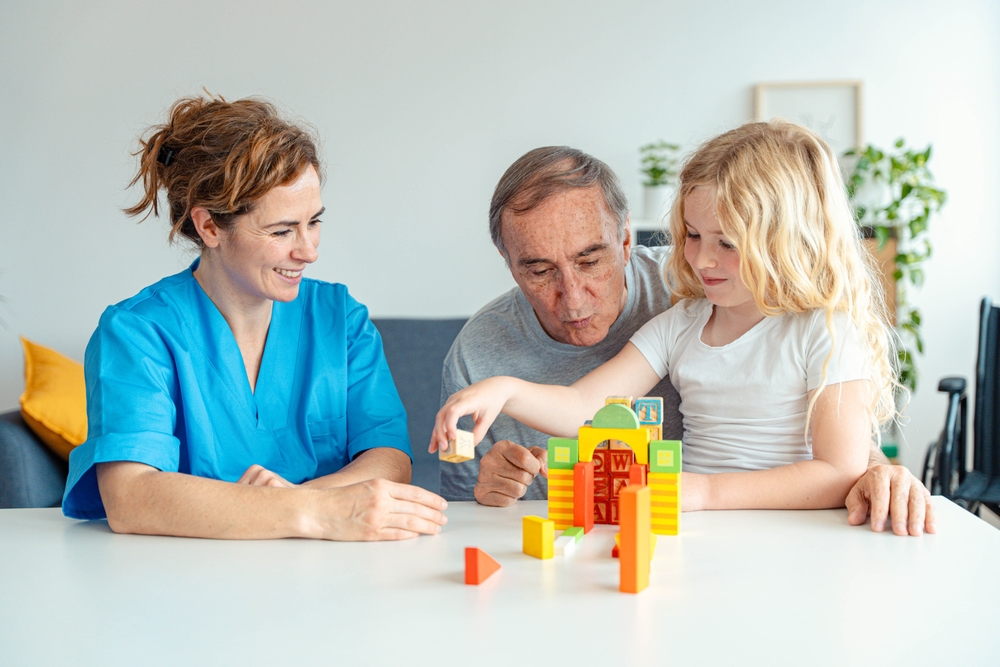Last Updated:
June 11th, 2025

For most of us, the love, care and endless devotion of our families made us into the people we are today. Our roots are intermingled with our family members, so one person’s suffering can become the suffering of the entire family.
This is why specific family therapy used in rehab can be enough to bring them back from the precipice of substance addiction and heal the family unit as a whole.
What exactly is a “Rehab family programme”?
As a person goes through rehab, there are long, arduous battles of both the body and mind. Detox usually comes first, helping a person physically clear their body of the substance they’re addicted to. After that, therapy is in place to help the person with psychological challenges that are part of the territory of quitting substance use.
One such type of therapy is called “Family therapy.” It is a “psychotherapy” used in the rehab process to help family members get together and better understand the challenges they face. Usually, expert family therapists deeply get to know each member as well as how the family unit functions as a whole.
What are the different types of family therapy?
Expert therapists can help both the individual struggling with addiction and their family with various types of family therapy. Some may be more suited to one family than another, as their problems will be completely unique to them.
Therapists may combine elements from different therapeutic approaches as they work to heal the family unit. Some of the forms of family therapy include:
Functional family therapy (FFT)
Therapists often use functional family therapy (FFT) for families who have children with behavioural issues. FFT deeply looks at the family dynamics and the contributors of a child’s behaviour, improving the way the family communicates and supports positive reinforcement.
Some family therapy courses may have different structures, but generally, most FFT programmes use a model of 5 phases:
- Engagement: This helps develop a positive perception of the therapist and the programme itself. It lays the groundwork for the family’s willingness to participate in counselling actively.
- Motivation: The second phase focuses on hope and the motivation for change. This is key for removing blame, which often plagues a therapy’s efficacy. It also looks at risk factors if the person were to drop out of therapy.
- Relational assessment: This phase plunges into the needs and hierarchy of the family unit as a whole. It opens the door for the therapist to deeply understand the functional roles in the family.
- Behavioural change: This phase looks at the specific skills for referral issues. It looks at the patterns in the family that maintain the persisting problems, including substance abuse.
- Generalisation: Finally, this phase looks at the resources and extra support that maintain the changes. Relapse prevention is employed to modify addictive behaviours.
Strategic family therapy (SFT)
Compared to some other forms, strategic family therapy is more short-term, typically lasting for 12 sessions. The expert therapist will focus on designing individualised interventions for more specific problems related to the family. The overarching premise of SFT is that family plays the most important role in the development of children. Similarly to functional family therapy, it may be optimised for families with children who have behavioural problems, who need a strategic outcome.
Structural family therapy
Structural family therapy is used to focus on the deep, inner relationships and boundaries that exist in a family unit. Structural family therapy looks at the interactions that happen between each member and seeks improvements in the rules that govern how the family works (its structure).
For many families who have a member struggling with addiction, it may be the case that one member is an “enabler” of some destructive habits, or takes a “co-parenting role” that is at the detriment of the family’s overall health. Structural family therapists help guide the family into finding their own alternatives to problematic behaviours.
Marriage counselling/couples therapy
For many people struggling with an addiction, some of the greatest stress might be placed on an entire family unit. Rather, the relationship between a person and their spouse or romantic partner may be strained the most. In this case, Licensed Marriage and Family Therapists (LMFTs) can use marriage counselling or couples therapy to help determine the current problems. It will greatly benefit a couple to identify any enabling behaviours concerning substance abuse and seek solutions that solidify their relationship.
What kind of problems can family therapy help solve?
Roughly speaking, every kind of therapy can be used to soothe, heal and rebuild problematic behaviours. The benefits of family therapy can include, but a not limited to:
- Understanding the damage caused by addictions
- Developing healthier boundaries between members
- Giving strength and coping tools for each member who needs them
- Defining and redefining a person’s role within the family
- Helping the family as a whole to improve problem-solving abilities
- Addressing interactions between members that are harmful or dysfunctional
- Working from the ground up to improve familial communication
There are a myriad of other benefits that family therapy can help with. Leading research from 2019 states that family therapy can effectively address issues in families with children, including:
- Substance addictions and substance use disorders (SUDs)
- Conduct disorders
- Offending behaviours
- Depression and mental health conditions
How can I find a family therapist?
In most cases, a professional family therapist is a Licensed Marriage and Family Therapist (LMFT), though they can also be a trained psychologist, counsellor, or social worker.
It is not always easy to find therapists who suit you. If you are in need, do not become discouraged if you find one that doesn’t feel quite right. Talk to people whom you trust to refer you to a therapist. This might be a primary healthcare provider, or someone dear to you, like a friend or family member.
How does family therapy work?
Led by a trained mental health professional, family therapy offers a safe, non-judgemental space where each member can share their concerns and begin working toward healthier dynamics.
Through guided conversations, a therapist can help family members to:
- Express concerns and listen to each other openly
- Understand how words and behaviours affect one another
- Develop strategies to manage conflict and change unhealthy patterns
- Explore ways to support a loved one with mental health or behavioural issues
Within a family therapy rehab programme, there can be group and individual sessions, depending on which work best for your family. Active participation is key, as progress is built on trust and willingness to tackle challenges.
Ultimately, the problems inherent in families that need therapy will need specific, targeted treatment. Your therapist is there to help your family heal as needed.
Ready to begin the healing process as a family?
If you or someone in your family is being damaged by addiction, you don’t have to try and solve the problems alone. At UKAT, our family programmes are designed to support a person and their family as they work towards being a stronger, healthier unit.
Whether you’re seeking help as a parent, partner, sibling, or child, we’re here to guide you every step of the way.
Reach out today. The first step toward healing the whole family could begin with a single conversation.
(Click here to see works cited)
- “What Is Psychotherapy?” Psychiatry.Org – What Is Psychotherapy?, www.psychiatry.org/patients-families/psychotherapy
- Functional Family Therapy (FFT), evidencebasedassociates.com/wp-content/uploads/2020/11/FFT-Logic-Model.pdf
- Kendra Cherry, MSEd. “What Is Strategic Family Therapy?” Verywell Mind, Verywell Mind, 1 Apr. 2024, www.verywellmind.com/strategic-family-therapy-definition-types-techniques-and-efficacy-5216431.
- Family Therapy and Systemic Interventions for Child-Focused …, www.sfft.se/dokument/Carr-2019-Journal_of_Family_Therapy.pdf




